Session 1: In this GrowthTrack, you will learn how to increase your ability to practice hospitality.



The first step on your learning journey is to review Danny Meyer’s session at The Global Leadership Summit and take a self-assessment on your current understanding of the topic. We understand that attending the Summit is like drinking from a fire-hose! So, as we focus on the topic of hospitality, let’s take this week to review the session.
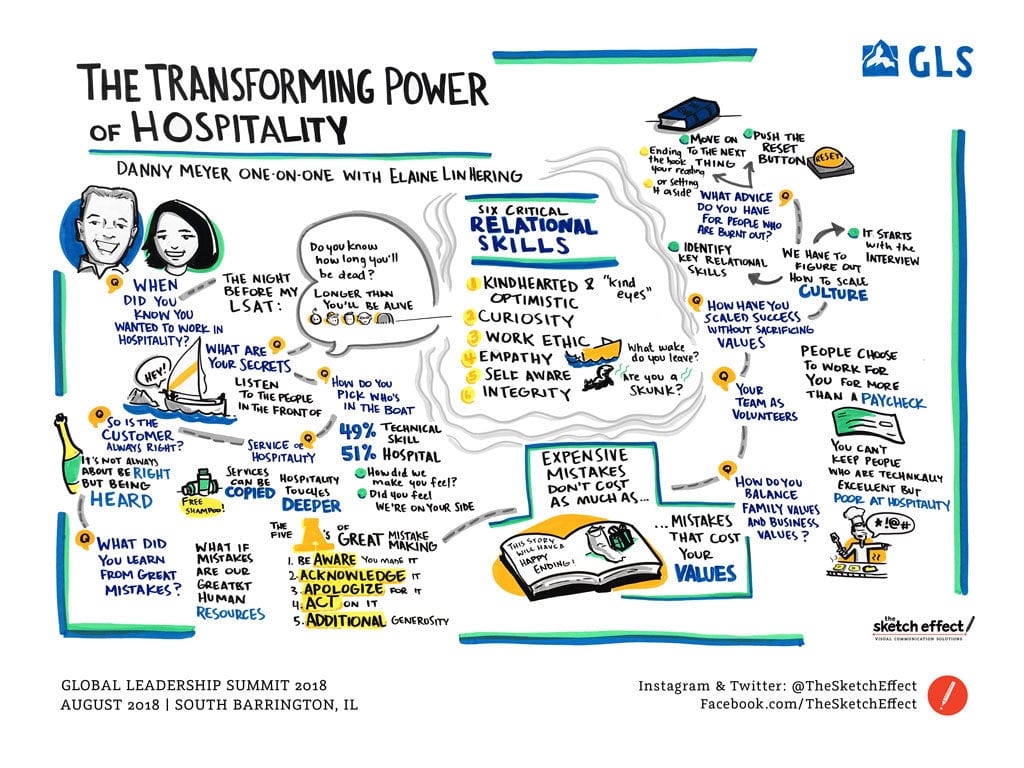
Danny Meyer – Hospitality – Graphic Recording
GLS18 Notes:
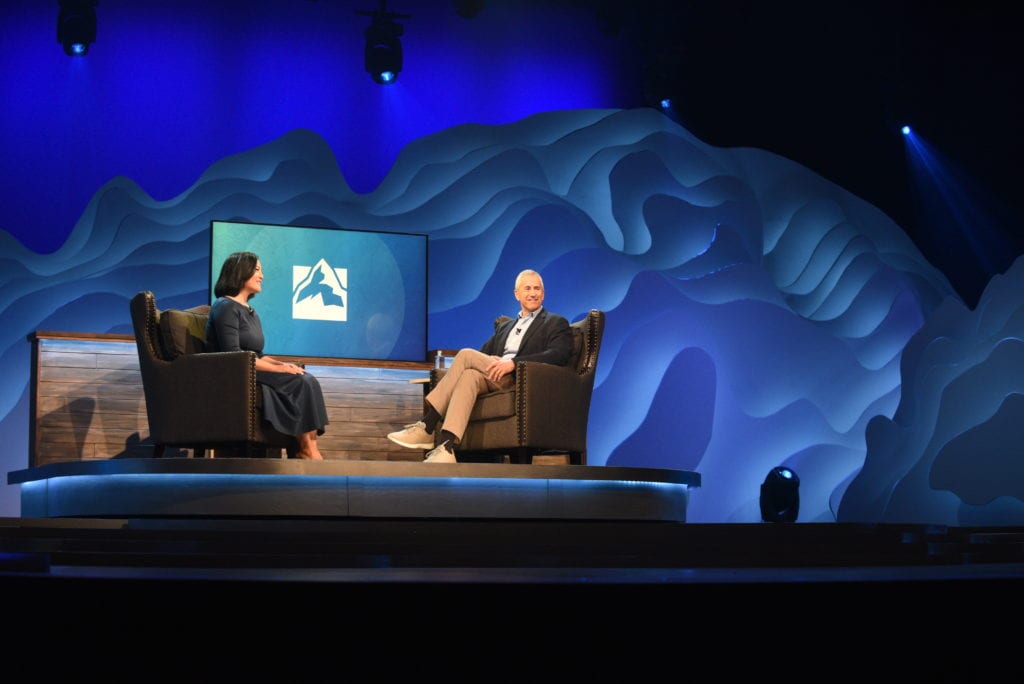
Elaine Lin Hering: You are a restauranteur responsible for some the most critically-acclaimed restaurants and a brand promise of hospitality. At what point did you know this was what you wanted to do with your life?
Danny Meyer: The night before I took my LSATs, I went out to dinner with my aunt and uncle. My uncle said, “What’s wrong with you?” I said I had to take my LSAT tomorrow. He said, “You want to be a lawyer, don’t you?” I said no. He then asked me the most impactful question of my life. He said, “Do you realize how long you are going to be dead?” I said no. He said, “I don’t know either. But it’s a heck of a lot longer than you’ll be alive. So why would you spend these precious moments of your life doing something you don’t want to do?” He added, “Your entire life, you have loved restaurants. You should open one.” It had never crossed my mind. I’m grateful to have found a calling where I could take something I love and share it with other people.
Hering: Now, you didn’t invent food or restaurants, and yet, you set the standard for restaurant experiences. In New York, there are more than 10,000 restaurants…
Meyer: 26,000 or 19,000 if you exclude the pizza parlors.
Hering: …restaurants are opening and closing all the time. Yours seem to have passed the test to time. What’s the difference? What are your secrets?
Meyer: I am a huge believer that the road to success is paved with mistakes well-handled. It’s like a sailing regatta. As the skipper, I got to pick the boat and decide where we’re going. But I need the people in the front to tell me what the conditions are and if we are heading for a crash. I truly need to listen to them.
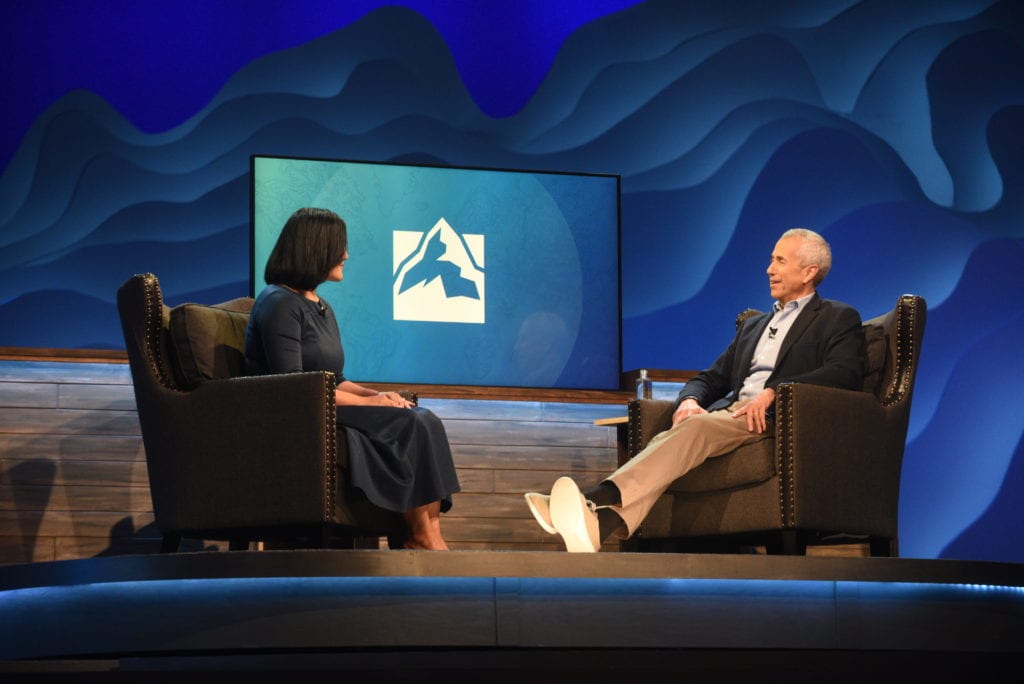
Hering: How do you decide who is in the boat with you?
Meyer: That’s the most important question there is. When I evaluate an employee, I look for 49% technical proficiency and 51% hospitality skills. Technical proficiency means you can do your job. But perfection in your job only counts for 49%. The rest is hospitality. Not service. Hospitality is about how we made you feel when we delivered service.
Hering: Parse that out for us. Everybody understands customer service, but you are talking about enlightened hospitality. Compare and contrast the two for us.
Meyer: Service is the technical side of the things we do. As an example, hotels with great customer service started to give away free shampoo, then conditioner, newspapers and a shoe shine. All those innovations were copied. The shelf-life of a service innovation today is about two minutes. Hospitality, on the other hand, is about how you feel. It is not as easy to copy. If I know how to deliver great service, and to make you feel better, you are going to probably come back to my place.
Hering: In the hospitality industry, there’s an idea that “the customer is always right.” Do you agree with that?
Meyer: That’s absolutely wrong. When I was young in the business, an investment banker came into the restaurant and asked for a Chardonnay. I brought him my most expensive Chardonnay – a white burgundy. He said, “That’s not a Chardonnay.”
So, my grandfather would say, “The customer is always right.” And my wine teacher would say, “A white burgundy is a Chardonnay.” So, I left and brought him a California Chardonnay. I learned it is completely irrelevant who is right and who is wrong. The only relevant thing is that the customer must always feel heard.
Hering: You said earlier that the road to success is paved with mistakes well-handled. What is a memorable mistake that you’ve made?
Meyer: Mistakes, if embraced and handled in a profitable way, could land you in a better spot than if you had never made the mistake in the first place. We teach the 5 A’s of mistake-making.
1. Be Aware of the mistake.
2. Acknowledge it.
3. Apologize for it.
4. Act on it.
5. Apply additional generosity.
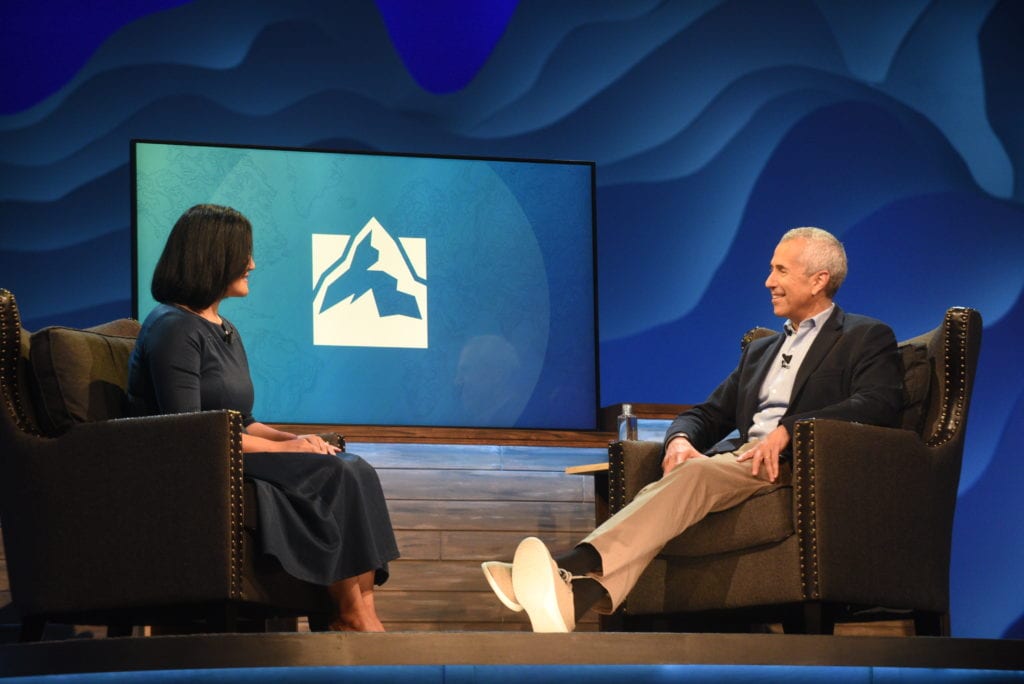
The only thing you can do is write a great next chapter. I would like to go down in history as the restauranteur who had the most patience with honest mistakes.
Hering: In your book you talk about memorable mistakes. Can you share one of those with us?
Meyer: This one happened after the book came out. During a large dinner party, as our servers were clearing the bread basket, I observed olive oil slowly drip onto the back of one woman’s brand-new Calvin Klein dress. I had our team get her a shawl. Then I called Calvin Klein and found that dress in her size and delivered it to woman’s apartment that night. The next day, we delivered a basket with salami and wine and a $500 gift certificate to come back. That was the additional generosity. We do these things all the time. Hopefully not all mistakes are going to be that expensive.
Hering: Talk to us about family values, since a restaurant team is often described as a family. How do you balance the camaraderie and caring of a family with the accountability of a professional team?
Meyer: Great question. First, we work to create sibling rivalry between our restaurants. But there are ways the family metaphor goes too far. You can’t fire people in your family who are not upholding the family values. When you find someone whose technical, hospitality and emotional skills are uplifting to the family, that person needs to be promoted and celebrated. But keeping someone who is technically proficient but lacks key hospitality or emotional skills ultimately diminishes our leadership.
Hering: You’ve talked about your employees as volunteers. Say more about that.
Meyer: As a 22-year old, I worked on a political campaign. I didn’t have a paycheck to motivate people. I brought that to my restaurants. I lean into our values and purpose to provide vision and motivation. You still need to compensate people well. The best talent in the world is looking for a place to belong at work.
Hering: How have you learned to scale your impact without compromising values or quality?
Meyer: What we’re working on the most is – beyond systems – how to scale culture. How do we scale the way we make you feel when you work in one of our places? How do we scale the way we make you feel when you dine in one of our places? It starts in the interview when we share what our company stands for.
We don’t just hire based on what you can do but who you are in six key emotional skills.
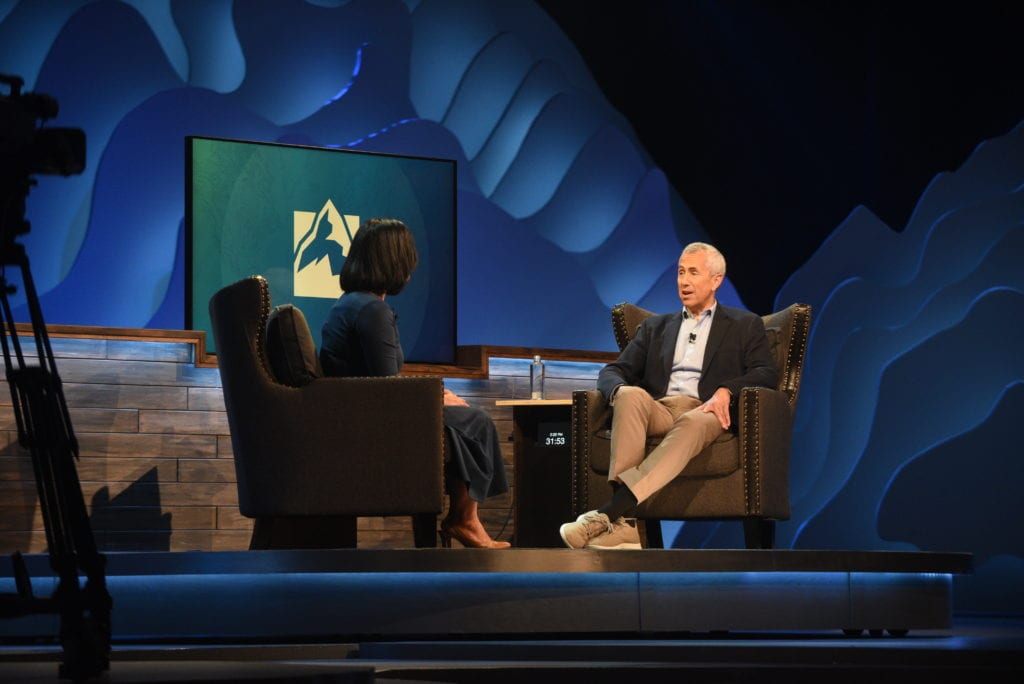
Hering: What are the six emotional skills?
Meyer: They seem obvious – but we have to be intentional.
1. Kind-hearted and optimistic
2. Curiosity
3. Work Ethic
4. Empathy
5. Self-Awareness
6. Integrity
All these emotional skills add up to a high HQ – Hospitality Quotient. These people are most satisfied when someone else feels better.
*Disclaimer: GLS2018 Session Notes are only available in the United States*
“Understanding the distinction between service and hospitality has been at the
foundation of our success. Service is the technical delivery of a product. Hospitality
is how the delivery of that product makes its recipient feel.”
For each of the following questions, write down your reflections in your journal.
1. Thinking back on the talk, what were your top insights? In your journal, write down the three phrases, concepts or insights that hit you the strongest.
a.
b.
c.
2. Describe the context of where you want to grow in your hospitality.
3. How is hospitality working well in this context right now?
4. How is hospitality not working well in this context right now?
5. What are you hoping to learn in this GrowthTrack?
1. Take the “Hospitality” Assessment:
Take the assessment below to get a baseline of your awareness of difficult conversations at the start of this journey. You will take this assessment again at the end of this GrowthTrack to track your growth over the next four weeks.
2. Review your responses to the assessment:
3. Calendar it! Block time in your calendar to go this course – 10 minutes per week over the next 4 weeks.
Instructions:
Take the following assessment to rate yourself on the level of hospitality you currently practice. Use the scale below to score yourself.
Scale:
1 – Always True of Me
2 – Most Times True of Me
3 – Sometimes True of Me
4 – Rarely True of Me
5 – Never True of Me
Questions:
1. I have a solid explanation I can use when talking about the difference between service and hospitality.
2. When practicing hospitality, I am able to accurately read a guest’s feelings.
3. In a hospitality situation, I notice details about what is going on in the room.
4. Before and after serving guests, I gather data on them and their preferences, to help provide a better experience for them.
5. In a hospitality situation, I purposefully think of ways to exceed my guest’s expectations.
6. When practicing hospitality, I actively listen to feedback from my guests, in order to improve their experience.
7. I know how the use of technology positively and negatively impacts my ability to deliver great hospitality.
8. I understand the difference between a gatekeeper and an agent, and I work toward being an agent for my guests.
9. I am surrounded by other people who care about hospitality.
10. I look for the right kinds of people for key hospitality roles in my organization.
We welcome and encourage comments on this site. There may be some instances where comments will need to be edited or removed, such as:
If you have any questions on the commenting policy, please let us know at heretoserve@globalleadership.org
“We welcome and encourage comments on this site. There may be some instances where comments will need to be edited or removed, such as:
If you have any questions on the commenting policy, please let us know at heretoserve@globalleadership.org”